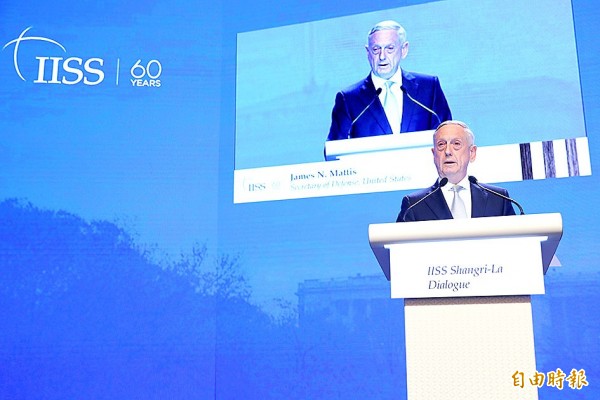《TAIPEI TIMES》 ‘Consequences’ for China: Mattis

US Secretary of Defense James Mattis addresses the Shangri-La Dialogue in Singapore yesterday. Photo: Bloomberg
REDUCED RAPPORT: Beijing would pay for antagonizing its neighbors militarily and through the debt incurred by its Belt and Road Initiative, the US defense leader said
/ Bloomberg
The world has to deal with China’s militarization of the South China Sea for now, but Beijing would face “larger consequences” in the long term that could persuade it to change track, US Secretary of Defense James Mattis said yesterday.
Beijing’s deployment of missile batteries and bombers to outposts in disputed areas appear aimed at intimidating its neighbors, Mattis told delegates at the International Institute for Strategic Studies’ Shangri-La Dialogue in Singapore.
Such moves had caused the US to reconsider its “cooperative stance” and disinvite China from the Rim of the Pacific Exercise later this month, he added.
That was a relatively small penalty for China to pay and the region would be “dealing with the reality” of its territorial claims over a vital global shipping route, Mattis said.
“I believe there are much larger consequences in the future, when nations lose the rapport of their neighbors,” Mattis told reporters after his speech.
He also attacked what he said were excessive loans made under China’s Belt and Road Initiative that were binding smaller nations in debt.
“Eventually, these things do not pay off, even if on the financial ledger sheet or the power ledger sheet they appear to,” he said. “It’s a very shaky foundation when we believe that militarizing features are somehow going to endorse their standing in the world.”
Mattis’ comments appeared to reaffirm the US’ commitment to Asia’s security, even as US President Donald Trump’s decisions to levy tariffs on allies and withdraw from international agreements have raised questions about its post-World War II alliances.
Challenged from the floor of the conference by several delegates, Mattis gave a forceful defense of the US’ commitment to its allies in the region, stretching back to former US president Thomas Jefferson.
“We have seen those who wanted to dominate the region come and go, and we have been with you,” Mattis said. “It’s not based on which party is in power.”
The Philippines has already sought accommodation with China over its South China Sea claims, but US House Committee on Armed Services Chairman Mac Thornberry told reporters he believes that attitudes to China in the region are hardening.
“It’s clear to me from the conversations I’ve had, not just the past week, but beyond, that China’s actions are increasingly alienating many countries, because they threaten the ability of countries to determine their own future, to provide for their people,” Thornberry said. “I think the larger trend is that countries are coming together to say this is unacceptable.”
In an exchange with Mattis, Senior Colonel Zhao Xiaozhuo (趙小卓), deputy director of the Center on China-US Defense Relations in China’s Academy of Military Science, said that sending warships into Chinese territorial waters was a violation of the nation’s law.
“Mattis’ speech was negative,” Zhao said. “If China’s islands and reefs are continuously threatened by activities under the name of so-called freedom of navigation, China will eventually station troops on these reefs.”
“We did not do freedom of navigation for America alone,” Mattis said. “We do freedom of navigation, give freedom for all nations, large and small, that need to transit those waters for their own prosperity and they have every reason to do so.”
Beijing sent a relatively low-level delegation to this year’s forum, where the US and its allies dominate. No Chinese official was scheduled to give the traditional Sunday speech, in what had become an outlet for a riposte to the US speech the day before.
新聞來源:TAIPEI TIMES


















